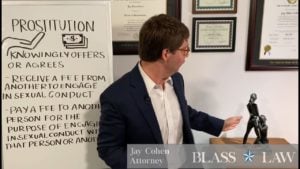
Texas law criminalizes both prostitution and the act of soliciting a prostitute. Still, anyone accused of either crime remains innocent until proven guilty. Have you recently been charged with such an offense? If so, you have the right to an attorney and due process under the law. Contact a Houston prostitution lawyer as soon as possible. The sooner, the better in resolving the case in your favor.
Still, not just any Houston criminal defense lawyer will do. To stand up against these charges, you need a legal team with a reputation for providing a tough, thorough defense. The team at Blass Law has the experience it takes to get the best results for anyone charged with prostitution.
Read on to learn more about prostitution laws in the state of Texas, along with how to choose the best prostitution attorney in Houston to represent you at this critical time.
Understanding Texas Prostitution Laws
Due to the sensitive nature of this kind of charge, factual data is key. While misinformation is easy to spread, it’s best to go directly to the source when discussing prostitution law and its associated facets: The Texas Constitution and Statutes.
If you’re facing charges related to any kind of prostitution, you’ll need to know exactly what you’re up against. All of Texas Penal Code Chapter 43 relates to Public Indecency, which includes details on prostitution. The specific subsections of 43.02 to 43.06 detail statutes related to prostitution, including :
- 43.02: Prostitution
- 43.03: Promotion of Prostitution
- 43.031: Online Promotion of Prostitution
- 43.04: Aggravated Promotion of Prostitution
- 43.041: Aggravated Online Promotion of Prostitution
- 43.05: Compelling Prostitution
- 43.06: Accomplice Witness, Testimony and Immunity
Now, let’s review a few of the most common reasons you might be facing charges of prostitution: committing the act, promoting it, or compelling it.
Prostitution
Under the Texas Penal Code, it is a crime for anyone to commit the offense of prostitution. The Statutory Definition of Prostitution describes two ways that someone could be charged for this crime.
Subsection (a) explains that a person commits prostitution if they knowingly:
- Offer to engage in sexual conduct for a fee; or
- Agree to engage in sexual conduct for a fee.
Note that under Subsection (a), a crime still occurs whether or not the actor actually receives a fee.
Under Subsection (b), a person also commits the offense of prostitution if they knowingly:
- Offer to engage in sexual conduct for a fee; or
- Agree to engage in sexual conduct for a fee.
Note that under subsection (b), a crime still occurs if the person offers or agrees to pay a fee to another person for the purpose of engaging in sexual conduct with that person or another. Similar to the caveat above, a crime still occurs under Subsection (b) regardless of whether or not the actor (or someone working on behalf of the actor) actually pays the fee, the agreement is what makes up the offense.
Promoting Prostitution
It is also a crime to promote prostitution in Texas. Also called pandering or pimping, someone who engages in this act will receive money or another kind of payout following an agreed-upon act of prostitution.
Under state law, a person commits this offense if he or she knowingly:
- Receives money or other property following an arrangement to participate in the proceeds of prostitution
- Solicits another person to engage in sexual conduct with someone in exchange for money or property
Say, for example, two men agree to split the money that a woman earns after an act of prostitution. Although the men themselves aren’t directly guilty of prostitution, they did engage in the promotion of prostitution, which is also punishable by law.
Still, this isn’t the only way that someone could promote prostitution.
One person can also solicit another person to engage in sexual contact with a third party for a fee. For instance, one man can solicit another man to engage in a sex act with a woman for a predetermined amount of money. Both this example and the one listed above describe acts of promoting prostitution.
This offense also includes anyone who oversees a prostitution enterprise that contains two or more prostitutes, exercising any form of the following types of oversight:
- Owning
- Investing
- Financing
- Supervising
- Controlling
- Managing
Compelling Prostitution
Compelling prostitution occurs when a defendant deliberately causes a child under the age of 18 to perform prostitution. This act is still a crime, regardless of whether the defendant knew the age of the child or not.
For a legal consultation with a prostitution defense lawyer serving Houston, call 713-225-1900
Classifying Texas Prostitution Crimes
We’ve described the different ways that someone could be charged with prostitution in Texas.
However, there are different classifications of the various types of prostitution crimes. Let’s take a look at each classification and its associated sentence and penalty.
Class B Misdemeanor
The following crime is considered a Class B Misdemeanor:
- Prostitution or solicitation (without any other aggravating factors)
The offense is punishable by:
- Up to 180 days in jail
- Fine of up to $2,000
Class A Misdemeanor
The following crimes are considered a Class A Misdemeanor:
- Pimping (without any other aggravating factors)
- Prostitution or solicitation by someone who has one or two previous convictions for the same offense
Each offense is punishable by:
- Up to one year in jail
- Fine of up to $4,000
State Jail Felony
The following crimes are considered a State Jail Felony:
- A repeat offense of pimping
- Prostitution or solicitation by someone who has three or more previous convictions for the same offense
Each offense is punishable by:
- Six months to two years in a state jail facility
- Fine of up to $10,000
Third Degree Felony
The following crime is considered a Third Degree Felony:
- Exercising control over a prostitution enterprise that contains two or more prostitutes
The offense is punishable by:
- Up to 10 years in prison
- Fine of up to $10,000
Second Degree Felony
The following crimes are considered a Second Degree Felony:
- Knowingly or unknowingly soliciting prostitution from someone younger than 18
- Soliciting prostitution from someone believed to be younger than 18
- Pimping the prostitution services of someone younger than 18
- Compelling someone younger than 18 to perform prostitution
Each offense is punishable by:
- Two to 20 years in prison
- Fine of up to $10,000
First Degree Felony
The following crimes are considered a First Degree Felony:
- Exercising control over a prostitution enterprise containing two or more prostitutes, at least one of which is younger than 18
In some cases, compelling a child under 18 to perform prostitution can also lead to another offense in this classification.
The offense is punishable by:
- Five years to life in prison
- Fine of up to $10,000
Houston Prostitution Defense Attorney 713-225-1900
How Can a Houston Prostitution Defense Lawyer Help?
If you’re charged with any of the above offenses, it’s critical to get in touch with a Houston prostitution defense lawyer as soon as possible. While your situation might seem dire, an experienced and qualified attorney can help you understand possible defenses that can make a difference in the outcome of your case.
Let’s take a look at a few examples of possible, viable defenses that could apply.
Entrapment
Many prostitution arrests are the outcome of an elaborate police sting operation or police entrapment. This describes a scenario in which a police officer or another government official causes you to commit a crime that you would not otherwise commit. While it can be difficult to prove that you were illegally enticed, it isn’t impossible.
It is illegal for an officer to encourage or entice you to commit a crime, including prostitution. If you were a victim of entrapment, your defense lawyer can help gather as much evidence as possible to support your case.
Due Process
In the event that an arresting officer is directly involved in the prostitution act itself, there are instances in which defendants could prove that the officer violated his or her constitutional rights.
For example, it’s considered inappropriate behavior if a police officer engages in a sex act as part of a prostitution sting. A judge might consider this a violation of due process and dismiss the related charges.
Lack of Probable Cause
An arresting officer must have probable cause to charge someone on the grounds of prostitution. This means the officer must be able to prove that an offer to engage in prostitution occurred prior to the arrest, beyond any reasonable doubt.
If you were arrested off a hunch or due to character bias, your lawyer can help identify this weakness in the prosecution and use it to your advantage.
Duress
Were you forced to perform or promote an act of prostitution because someone else threatened violence or any other kind of harm against you if you refused? If so, this is considered duress and is a powerful defense in court.
These are a few examples of some of your strongest defenses against Texas prostitution charges. If you choose to represent yourself without legal counsel, you could lack the ability to build a credible and effective case that could prove the above issues are at play.
Click to contact our Houston Criminal Defense Lawyer today
Hire a Houston Prostitution Lawyer Today
Have you been charged with prostitution in the greater Houston area? If so, you need a knowledgeable prostitution lawyer by your side to help you navigate the intricacies of these charges, so you can fight them in court.
Our skilled, non-judgmental team of criminal defense attorneys is well-versed in the Texas criminal justice system. Regardless of which particular charge you’re facing, we’ve dealt with it in the past.
We’ll work with you to understand every detail of your case in an attempt to get your charges reduced or your penalties lessened to the greatest extent possible. We’ll even try to get your case dismissed and the crime kept off your record if we find evidence of police errors or another issue that could undermine the credibility of your charge.
Get in touch with us today for a no-obligation case evaluation. Let’s take this next step forward together.
Call or text 713-225-1900 or complete a Case Evaluation form



